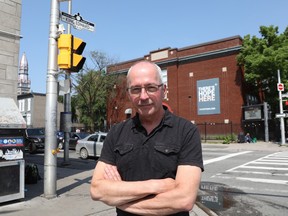The block leaders program was launched in response to a recommendation from a community task force aimed at addressing social disorder in the ByWard Market.

Article content
Ottawa Inner City Health has launched a program designed to rebuild a sense of community among ByWard Market drug users — and to address the social disorder that now troubles the neighbourhood.
The Block Leaders Program employs drug users and shelter residents to do the hard work of refashioning human connections shredded by fentanyl, the COVID-19 pandemic and the death toll wrought by a toxic drug supply.
Advertisement 2
Story continues below
Article content
“We’ve lost a lot of leaders in this community over the last five years, people who would normally be out there enforcing these community norms and expectations,” said Rob Boyd, chief executive officer of Ottawa Inner City Health.
“The block leaders program gives us a chance to rebuild that leadership and reset the community norms back to what they were five years ago.”
It used to be, for instance, that drug users would not inject near children. The community code, Boyd said, demanded that someone yell “kid’s up” if a family approached, and everyone would store their gear until the children were out of sight.

But that norm has been lost as fentanyl and the pandemic combined to create chaos.
“It created an environment where it was every person for themself, and people stopped taking care of each other,” Boyd said. “That’s what we’re trying to restore.”
During the past year, the program has trained more than 100 people as block leaders. Paid a small stipend, the block leaders work in pairs in two-hour shifts. They walk around the ByWard Market to engage with homeless people and drug users and to solve common problems.
Advertisement 3
Story continues below
Article content
Block leaders, for instance, deliver early-morning wake-up calls — with coffee and muffins — to people sleeping outside Market businesses. They also ask people loitering in front of private homes to move. The block leaders don’t issue orders, but gently make the case for good citizenship.
Isam Mahmood, 45, who arrived in Ottawa from Iraq in 2015, said he liked the program because it gave him the opportunity to help people. He has learned to be patient.
“I tell people, ‘You are homeless. I am homeless, too. We are family,’” he said. “I say, ‘I’m your friend, I’m your brother. How can I help you?’”
Mahmood said he had helped solve disputes over property that might have in the past flared into violence.
Jessica Casselman, 30, arrived in Ottawa from Belleville about nine months ago and joined the block leaders program as way to meet and engage with people. It has been rewarding, she said, to be thanked by business owners for cleaning up the area.
“We clean up the garbage, the needles, the pipes — the kids don’t need to see that,” Casselman said.
Kehinde Saka, 32, said he liked the program because it was about people from the community trying to solve their own problems. He has brought people to the health clinic to have wounds treated and has guided others to their destinations.
Advertisement 4
Story continues below
Article content
“It has changed my mentality,” he said, “and taught me how to listen to people and communicate with people. Most of them are out there without a family, so we are their family now.”
The block leaders program was launched in response to a recommendation from a community task force aimed at addressing social disorder in the ByWard Market.
Wendy Muckle, the retired director of Ottawa Inner City Health, volunteers with the program as an operational co-ordinator and training consultant.
“It’s about recovering citizenship,” Muckle said. “This is about a very basic thing: How do you reknit a society? We have to go back to the basics, to be nice to each other and to co-operate.”
Muckle said she had already started to see positive effects, including the re-emergence of an old moral code.
“Now, when you get some creepy guy hassling young girls in the community, the community will run him off — literally run him off,” she said. “That was always the way the community operated. There were these rules and there was a social structure, and there were people that enforced them. We lost that when fentanyl arrived.”
Advertisement 5
Story continues below
Article content
Fentanyl and its analogues are powerful synthetic opioids that metabolize quickly in the body; it means drug users typically inject themselves eight to 12 times a day to avoid feeling dope sick.
In Ottawa, more than 450 people have died from opioid overdoses in the past three years — most of them from fentanyl — while others have brain damage due to hypoxia after surviving overdoses.
The block leaders program is funded by Ottawa Inner City Health. The organization, which has delivered health care to Ottawa’s homeless community for 23 years, hopes to expand the program to include an on-call service for local business owners.
Boyd believes the program works because it’s driven by those on the street.
“We think it’s really important that the people who are seen as the cause of social disorder are here as a very visible solution to that social disorder,” he said.
Andrew Duffy is a National Newspaper Award-winning reporter and long-form feature writer based in Ottawa. To support his work, including exclusive content for subscribers only, sign up here: ottawacitizen.com/subscribe
Recommended from Editorial
Article content


Comments